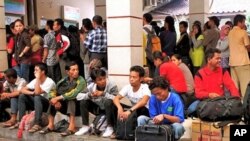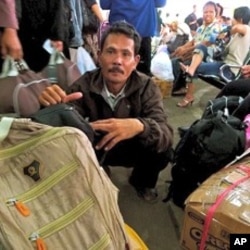Traffic snarls are plaguing Jakarta as millions of residents hop in cars, buses and trains to journey back to their hometowns for Muslim Idul Fitri celebrations, marking the end of Ramadan. The exodus is one of the world's largest, and long waits are just part of the problem.
Heading home
"Ayo Mudik," or "let us go home," is the popular term for the exodus that marks the end of the fasting month of Ramadan. For Jakarta dwellers, traffic jams, long lines and inflated ticket prices are just part of the holiday period, which also is called Lebaran.
The celebration, known as Eid al-Fitr in many countries, begins Friday, September 10.
On Wednesday, two days before the holiday starts, Andrik Eko, a factory worker Jakarta, says he bought his ticket early to avoid long delays and higher prices.
He says ticket prices go up nearly 200 percent around Idul Fitri. But this kind of thing only happens once a year, so it is better to just accept it.
What is the trip like?
Around a quarter of Jakarta's nine million residents are expected to return to their hometowns in the coming days. Most of them will go by road, but for those who have the time, and a bit of extra cash, the train is a safer alternative.
Eko, who will travel 18 hours to his home in East Java, says buses still get stuck in traffic and human error is a big concern because people have to depend on the driver.
Last year more than 450 people were killed in accidents during the holiday, many of them motorbike passengers packed four-deep on bikes built for two.
Costly voyage
The Transportation Ministry asks people not to use motorbikes for long journeys. The government is providing trucks and special rail cars to help those using public transportation get their motorcycles home.
At the Senen train station in northeast Jakarta, ticket lines snake around departure areas. Families sit on floor mats, waiting hours or days to begin their journeys.
Two women packed between bags of chocolate milk and treats they will give away have been waiting seven hours for their train to leave.
Sumini says she tried to buy a bus ticket in the morning, but the only ones left were being sold by scalpers.
She says it is much easier to take the bus, but they have to book the tickets two weeks before they plan to leave. Just now there was a ticket, but it is too expensive so she gave up.
Souvenirs
At the station, vendors sell knick-knacks and crisp new rupiah notes to travelers who will give them out as gifts. Idul Fitri is a time of spiritual renewal and togetherness, but it also provides an opportunity for people to show off their accomplishments in the big city.
Many travelers say the cost of the trip home is not a problem, but they worry about having enough money to buy gifts for those still living in their villages.
Some companies help their employees by providing free transportation. Cement giant Holcim sent 5,000 masons back to their villages Sunday. Company spokesman Budi Primawan says the service is a sign of thanks.
"It is just a bit of appreciation and also a way to show that we have a very good understanding of the situation," Budi said, "you know, because during Lebaran people are coming back and it is quite difficult to find transportation, so we thought we could help the masons to celebrate Idul Fitri at their hometowns."
Safety measures
To ease the gridlock, and reduce the number of traffic accidents and robberies that happen each year, the Transportation Ministry monitors security cameras around the archipelago to pinpoint areas of danger.
Security officers at the Senen train station say their job is to make sure people are safe, do not lose things and are not bothered by others. A health station monitors people's blood pressure and makes sure they receive assistance if they feel faint.
Having to wait in long lines and cramped conditions can take a toll on passengers, particularly since many are fasting during daylight hours.
With tickets going fast, scores of travelers prepare to spend the night in the station. Wahyudi, who sells chicken porridge, has just found out he can not get a train home until the next morning. He smiles and lays his head on a box of second-hand clothes he plans to give to his four children.
He might as well wait, he says. He is in Jakarta to earn a living, and decided to go home because business will be slow during the holiday.













